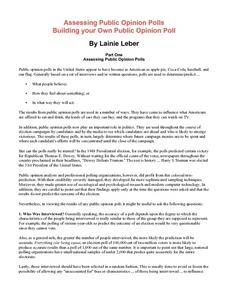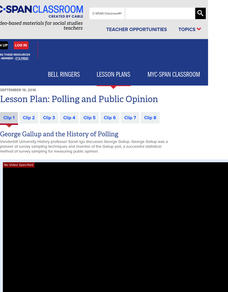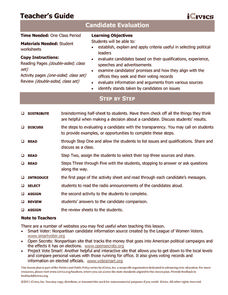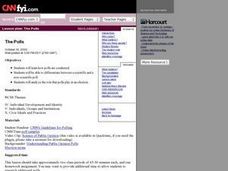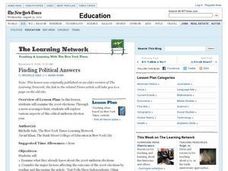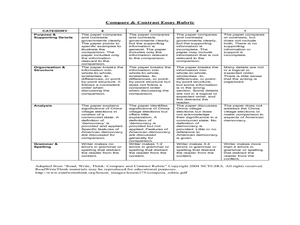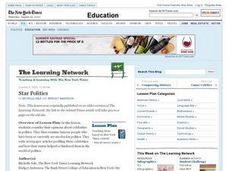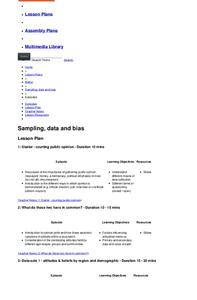C-SPAN
Polling and Public Opinion
Most people are eager to offer their opinions about topics of interest, but what's the most effective way to collect and assess these opinions as a matter of fact? High schoolers learn about the history of polling, as well as the...
Curated OER
Assessing Public Opinion Polls and Building Them
Students explore the role of public opinion polls in America. In this public opinion polls lesson, students discover the steps of analyzing poles before they create and conduct their own polls.
Curated OER
Who Could Have Been Who
Can word choice affect a candidate's likeability? Use a New York Times lesson to explore how a presidential candidate's likeability factor can fluctuate in public opinion polls. Young readers choose a presidential election from their...
Curated OER
Assessing Public Opinion Polls
Learners are introduced to the purpose of public opinion polls. Using recent polls, they determine the demographics of who was interviewed and when and where the interview was conducted. In groups, they develop their own public poll...
C-SPAN
Polling and Public Opinion
Polls are ubiquitous in American politics, but just how reliable and equal are they? A video-driven resource helps learners discuss the question by examining what pollsters and pundits say. Extension activities involve evaluating the...
Curated OER
Voter Fraud: Are Ghosts Going To The Polls
Students research background material about voting in their community. They interview local/county election officials to see what is going on in the community. They also interview teachers, and students to determine if they are newly...
Mikva Challenge
Why Vote?
Elections are supposed to represent the will of the people. So why don't 100% of registered voters line up at the polls on Election Day? High schoolers study the last few elections and the voter turnout for each, according to race,...
iCivics
Candidate Evaluation
How can we decide between candidates on election day? After contemplating various issues and qualities, your learners will go through a step-by-step process of researching and evaluating sample candidates and determining their...
Curated OER
INVITING CANDIDATES TO CLASS
Students explore the election process by researching politcal platforms, inviting candidates to speak, surveying registered voters, and running a mock election.
Curated OER
The Polls
High schoolers obtain how polls are conducted. They differentiate between scientific and non-scientific poll. They analyze the role that polls play in an election.
Curated OER
Political Polling
Students examine the roll of polling in elections and assess information provided by polls. They define the term survey. Pupils conduct a poll, individually each student answers the questions, as a group, tally the results. Students...
C-SPAN
Electoral College Pros/Cons and Alternatives
If every vote counts, why do we need the electoral college? Middle and high schoolers study the Constitutional precedent of the electoral college, as well as its place in historical and modern elections, with an engaging social studies...
Curated OER
Election 2005: Campaign Issues
Students take a closer look at the election of 2005. In this British politics lesson, students listen to a lecture about the 2005 campaign and active citizenship. Students then create collages and news boards about the election. Older...
Curated OER
Finding Political Answers
Students discuss the 2006 midterm elections. They read an article about exit polls. They create a scavenger hunt using articles of the New York Times. They write a paper about the importance of midterm elections.
Curated OER
Democratic Village Elections in China: Comparing Governments of China and the United States
Students explore democratic practices in China. In this global studies lesson, students compare and contrast democratic values of the Chinese government with the American government. Students read provided articles and conduct their own...
Curated OER
Exit to the Left
Students share their own thoughts about the United States' involvement in Iraq. They read an article about what the Democrats would do if they were in charge. They develop a poll for members of their community to take and analyze the...
Curated OER
Star Politics
Students discuss the advantages of a celebrity running for a public office. After reading an article, they examine the results of the California governor recall vote. In groups, they research the aspirations and career of a celebrity...
Curated OER
To Vote or Not to Vote? that is the Question!
Students examine voting rights provided by the United States Constitution. In this voting lesson, students focus on 3 amendments that extended voting rights to all citizens. Students discuss the importance of expressing opinions through...
Curated OER
Maps
Students investigate threee types of maps. In this algebra lesson, students idenitfy different maps and explore how they relate to the area keeping cllimate and topography in mind. They discuss maps used to navigate land. air and sea.
Curated OER
Our Constitutional Connection Lesson 3: To Vote Or Not To Vote? That is the Question!
Students design colorful posters to "get out and vote" after studying the three amendments to the US Constitution that extend voting rights. They analyze the importance of voting to a healthy democracy.





